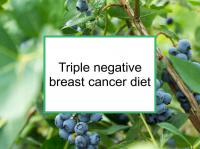Estrogen receptor expression can vary greatly in breast cancer cells. Even cells classified as estrogen receptor negative (ER-) can exhibit a small degree of ER expression. What is perhaps less well known is that the level of ER expression is not necessarily static for a given patient—it can vary within a tumor and change over time.
Loss of ER expression is an unfavorable prognostic indicator. Now a new study has reported that the combination of resveratrol and pterostilbene, two compound found most abundantly in blueberries and black and red grapes, can reactivate ER expression in triple negative (ER-/PR-/HER2-) breast cancer cells.
Blueberries inhibit breast cancer
Blueberries have been shown to inhibit both hormone receptor positive (ER+/PR+) and hormone receptor negative breast cancer cell growth in the laboratory. Blueberry extract was found to inhibit cell proliferation in triple negative cells with no effect on normal breast cells in one study. Blueberry also reduced the motility of triple negative cells (i.e., the ability to move, which is required for metastasis).
Blueberry diets have also been shown to reduce mammary tumor development in animal models of breast cancer. For example, whole blueberry powder was shown to reduce both mammary tumor growth and metastasis in a rodent model of triple negative breast cancer under conditions of systemic inflammation.
Analysis of tumor tissues demonstrated that blueberry-fed mice tumors had significantly altered expression of genes important to inflammation, cancer, and metastasis. In another study of triple negative breast cancer, mice fed a diet incorporating 5% whole blueberry developed 70% fewer liver metastases and 25% fewer lymph node metastases than control mice not fed blueberry.
Latest research finds resveratrol plus pterostilbene can increase ER
The study referenced at the beginning of this news story was designed to investigate the combined effects of resveratrol and pterostilbene on ERα expression in ERα-negative breast cancer cells. There are two types of estrogen receptors: estrogen receptor-alpha (ERα) and estrogen receptor-beta (ERβ). Some compounds that bind to ERα do not bind to estrogen ERβ and vice versa. Both types of estrogen receptor are therapeutic targets in breast cancer.
Treatment with a combination of resveratrol plus pterostilbene was found to increase enrichment of acetyl-H3, acetyl-H3lysine9 (H3K9) and acetyl-H4 active chromatin markers in the ERα promoter region in ER- breast cancer cells. The treatment also significantly modified HDAC and histone acetyl transferase (HAT) enzyme activity after three days of treatment. In addition, the combination reduced DNMT enzyme activity and 5-methylcytosine levels in MDA-MB-157 triple negative breast cancer cells.
Furthermore, the reactivation of ERα expression by resveratrol combined with pterostilbene was found to sensitize the ERα-dependent response to 17β-estradiol (E2)-mediated cellular proliferation, as well as tamoxifen-mediated inhibition of cellular proliferation in ERα-negative breast cancer cells. In fact, E2 and 4-OHT further affected the ERα-responsive downstream progesterone receptor (PR) gene in ERα-reactivated triple negative cells. The authors conclude that the phytochemicals resveratrol and pterostilbene might provide a new and safer way of restoring ERα expression through epigenetic mechanisms.
Please see our article on diet for triple negative breast cancer for more information.
